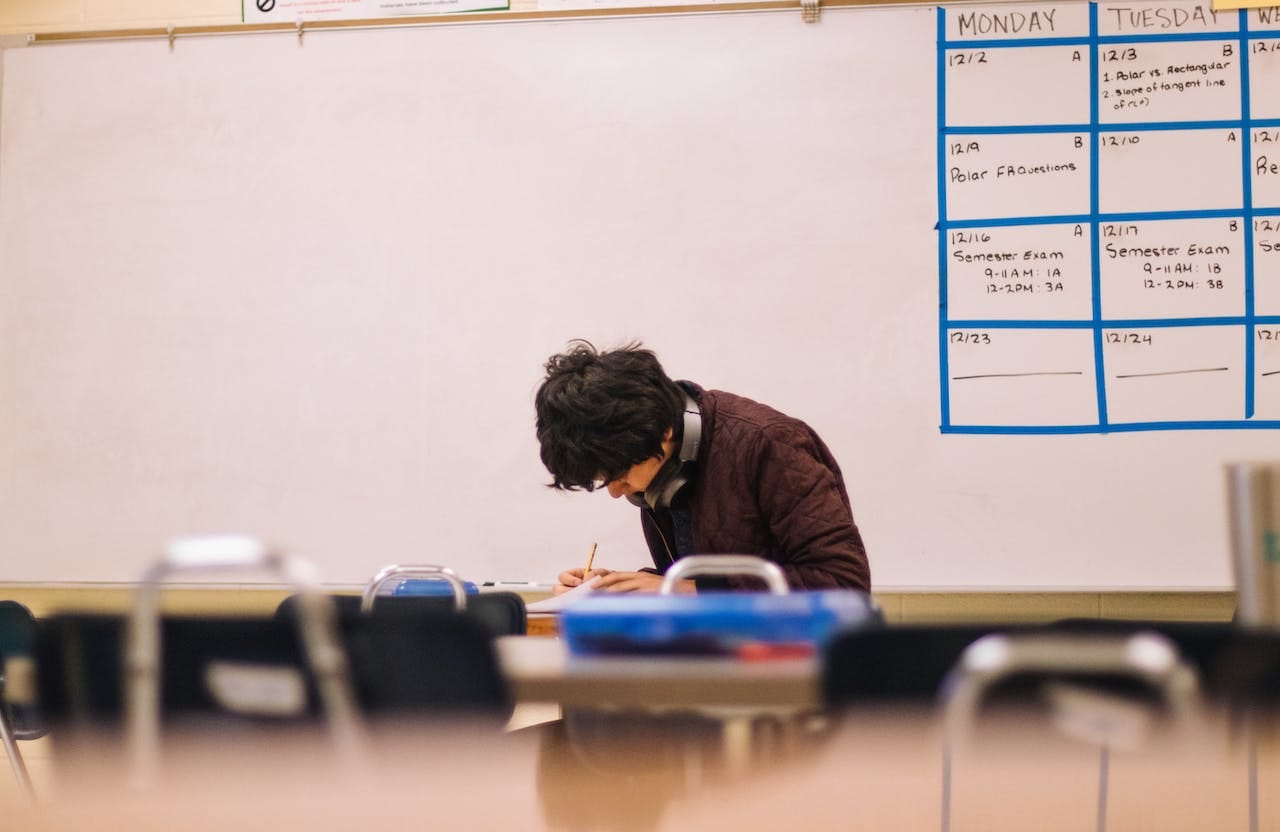What Is International Baccalaureate?

International Baccalaureate (IB) is an educational program that aims to develop well-rounded young people who are active, knowledgeable, and engaged global citizens. It provides a rigorous and comprehensive curriculum for students aged 3 to 19 and is recognized worldwide for its high academic standards and emphasis on critical thinking skills. Ahead, explore the key principles of IB programmes, what IB students can expect in the IB diploma programme, and answers to some frequently asked questions about IB educational programmes.
Here at Bold.org, we are committed to helping students eliminate student debt. Check out our Scholarship Blog for more financial tips and learn how to apply for scholarships today!
What an IB School is All About
The International Baccalaureate (IB) programme was established in 1968 with the goal of creating a curriculum that fosters international education, encourages intercultural understanding and respect, and prepares students for a rapidly changing world. Initially started as a diploma program for students aged 16 to 19, it has since expanded to include a Primary Years Program (PYP) for children aged 3 to 12 and a Middle Years Program (MYP) for students aged 11 to 16.
IB has become a renowned educational framework that is recognized and respected worldwide. The program's expansion has been remarkable, with its reach now extending to over 5,500 schools across 158 countries. With more than 1.4 million students enrolled in its programs, the International Baccalaureate has become a symbol of quality education and international collaboration.
The growth of the International Baccalaureate program is a testament to its success in providing students with a comprehensive and well-rounded global education, producing knowledgeable and caring young people. By offering a continuum of programs from early childhood to adolescence, the IB programme ensures that students receive a seamless and cohesive educational experience that prepares them for the challenges of the modern world.

The Core Philosophy of International Baccalaureate
The core philosophy of the International Baccalaureate revolves around the development of intellectual, personal, emotional, and social skills in students. It aims to create lifelong learners who are compassionate and capable of positively impacting the world.
At the heart of the International Baccalaureate program is a commitment to fostering international-mindedness. IB world schools recognize the importance of global citizenship and aim to cultivate in students a deep appreciation for different perspectives, cultures, and languages. By encouraging students to engage with diverse ideas and experiences, IB courses promote intercultural understanding and prepare students to thrive in an increasingly interrelated world.
The IB curriculum also places a strong emphasis on inquiry-based learning. Students are encouraged to think critically, ask questions, and explore topics in depth. This approach to education not only develops students' intellectual abilities but also nurtures their curiosity and love for learning. By empowering students to take ownership of their education, the IB programme instills a lifelong passion for knowledge and a desire to grow and develop continuously.
In addition to academic excellence, IB world schools also place great importance on the development of personal and social skills. Through various activities and projects, students are given opportunities to develop their leadership abilities, communication skills, and ethical awareness. The program aims to develop inquiring and well-rounded individuals who are not only academically proficient but also compassionate, empathetic, and socially responsible.

The Structure of the International Baccalaureate Program
Primary Years Program (PYP)
The Primary Years Program (PYP) is an educational framework designed to nurture curiosity and a love for learning in young children. These IB students develop essential skills, knowledge, and concepts across various subject areas, including language, mathematics, science, social studies, and the arts.
The PYP utilizes a multidisciplinary approach to inquiry-based learning, where students actively participate in the construction of their own knowledge across topics. This approach encourages students to ask questions, explore different perspectives, and critically reflect on their learning experiences. Within the PYP, IB students engage in a range of activities and projects that allow them to apply their knowledge and skills in real-world contexts. The program also emphasizes the development of attributes such as independence, resilience, and empathy, which are essential for lifelong learning.
Middle Years Program (MYP)
The Middle Years Program (MYP) builds upon the foundations laid in the PYP and provides a comprehensive curriculum for IB students in their early adolescence. It focuses on a holistic education, integrating academic rigor with a strong emphasis on personal development. Students in the MYP engage in interdisciplinary learning, where they make connections between different subject areas and develop a broad perspective on knowledge. These IB students are encouraged to explore local and global issues, analyze multiple viewpoints, and develop their own informed opinions.
In addition to academic subjects, the MYP also emphasizes the development of key skills such as research, communication, and self-management. Students are encouraged to take responsibility for their own learning, set goals, and reflect on their progress. This approach encourages students to become self-directed learners. They also have opportunities to participate in service projects and extracurricular activities, fostering their personal growth and social awareness.

The IB Diploma Program (DP)
The Diploma Program (DP) is the flagship program of the International Baccalaureate and is designed for students aged 16 to 19. It offers a challenging and comprehensive curriculum that prepares students for higher education and beyond, all while earning an IB diploma.
At the heart of the DP is the Diploma Core, which consists of three components: Theory of Knowledge (TOK), Extended Essay (EE), and Creativity, Activity, and Service (CAS). These components aim to develop students' critical thinking, research skills, and sense of social responsibility.
In the Theory of Knowledge course, students explore the nature of knowledge and the ways in which it is acquired, evaluated, and applied. Through this knowledge course, students critically examine different areas of knowledge, such as the natural sciences, mathematics, history, and the arts, and consider the methods used to produce knowledge within these areas.
The Extended Essay is an independent research project that allows students to delve deep into a topic of their choice. They develop research skills, formulate research questions, and gather and analyze data to produce a substantial piece of academic writing.
Creativity, Activity, and Service is a program that encourages students to engage in a variety of activities outside the classroom. They participate in creative pursuits, physical activities, and community service projects, developing their skills, interests, and sense of social responsibility.
Other IB courses enable students to deeply explore specialized topics like mathematics, global politics, experimental sciences, and philosophy. This aspect of the IB Diploma Programme prepares students for academic study at more rigorous levels, from college to beyond.
Through the IB Diploma Programme, students take IB exams assessing their progress towards academic goals. These IB exams cover a broad range of topics and rigorous coursework and take place in a few select weeks of the year, similar to the AP exams system. IB students can receive college credit upon successful completion of IB exams and achievement of a full IB diploma. Students can also earn an IB career-related certificate depending upon which courses they completed.

Academic Advantages of International Baccalaureate
Studies have consistently shown that students who complete the IB programme are more likely to succeed in higher education and score higher on standardized tests compared to their peers. The rigorous academic curriculum, combined with the emphasis on critical thinking and inquiry-based learning, equips students with the skills and knowledge needed to excel in university-level studies.
One of the key strengths of the IB programme is its focus on interdisciplinary learning. Students are encouraged to make connections between different subjects, fostering a holistic understanding of various topics. This approach not only enhances their analytical skills but also nurtures a broader perspective, enabling them to tackle complex real-world problems.
Furthermore, the IB programme encourages students to become independent learners who take ownership of their education while gaining the skills necessary to succeed in academically challenging college environments. They develop strong research, writing, and presentation skills, which are essential for success in college and beyond. Through extended essays, internal assessments, and oral presentations, students gain valuable experience in conducting in-depth research and effectively communicating their ideas.
Get Matched to Thousands of Scholarships
Create your Bold.org profile to access thousands of exclusive scholarships, available only on Bold.org.
Create Free ProfilePersonal Development Opportunities
In addition to academic benefits, the IB programme places a strong emphasis on personal development. Through the IB Learner Profile, students are encouraged to become reflective, caring, and principled individuals who take responsibility for their actions and contribute positively to society.
The programme also promotes the development of essential skills such as time management, organization, and communication. Students learn to effectively manage their workload, balance extracurricular activities, and meet deadlines. These skills not only benefit students during their academic journey but also prepare them for future careers and life challenges.
Moreover, the IB programme fosters a multicultural and inclusive environment where students from diverse backgrounds come together to learn and collaborate. This exposure to different perspectives and cultures cultivates empathy, open-mindedness, and a global mindset, which are increasingly valued in today's interconnected world.
Another unique aspect of the International Baccalaureate (IB) is its emphasis on creativity, action, and service (CAS). Students are encouraged to engage in creative pursuits, participate in physical activities, and actively contribute to their communities through service projects. This holistic approach to education promotes a well-rounded development, nurturing students' passions and encouraging them to make a positive impact on the world around them. Higher education institutions favor applicants with strong extracurricular profiles, so this aspect of IB helps students in the college application process.

How International Baccalaureate Differs from Other Education Systems
Comparison with National Curriculum
Unlike national curriculum systems that are specific to a particular country, the International Baccalaureate (IB) program offers a globally recognized education. It provides students with a broad and balanced curriculum that goes beyond the limitations of a single national perspective.
IB programmes not only focus on academic knowledge but also on developing transferable skills that are applicable in any cultural or geographical context and college or university setting. By encouraging students to think critically, communicate effectively, and appreciate different cultural perspectives, the IB program prepares them to thrive in an increasingly interconnected world.
The IB curriculum incorporates a wide range of subjects, including languages, sciences, humanities, and the arts. This interdisciplinary approach allows young people to explore diverse areas of knowledge and develop a well-rounded understanding of the world.
Moreover, the IB Diploma Programme enables students to earn college credit or an IB career-related certificate for the successful completion of their studies. This is highly attractive to students who wish to attend college or university and continue their education at a higher level.

Comparison with Advanced Placement
While Advanced Placement (AP) programs offer college-level courses and exams, the International Baccalaureate (IB) program offers a more holistic and comprehensive educational experience. The IB program emphasizes not only academic rigor but also personal development, intercultural understanding, and social responsibility. The IB programmes promote the development of essential skills such as critical thinking, communication, and collaboration. These skills are crucial for success in higher education and the workplace.
Furthermore, the IB program encourages students to take an interdisciplinary approach to learning, making connections across different subject areas and developing a broader perspective on knowledge. Unlike in the AP program, IB students gain a deeper understanding of complex issues and develop a more holistic view of the world by integrating various disciplines.
Moreover, the IB program places a strong emphasis on community service and encourages students to engage in meaningful activities that contribute to the betterment of society. This fosters a sense of social responsibility and empathy, preparing students to become active global citizens. Students are also encouraged to participate in extracurricular activities such as sports, arts, and community service. This promotes a balanced lifestyle and nurtures the growth of students' talents and interests.
Cost and Accessibility Issues
A major criticism of the IB programme is its cost and accessibility. The program requires schools to pay fees for authorization, training, and ongoing support. Only a school authorized to teach the IB curriculum can do so, but it is expensive and time-consuming to receive this authorization. These costs can be prohibitive for many schools, limiting access to the program for students in public schools.
Efforts are being made to address these accessibility issues, with scholarship programs and initiatives aimed at increasing the availability of the IB program in schools with limited financial resources. Additionally, some schools are exploring alternative funding options, such as grants and sponsorships, to reduce the financial burden on students and their families.

Frequently Asked Questions About International Baccalaureate
How do I attend an IB programme?
You can find a school authorized to teach the IB curriculum using the IB World School website. Many of these institutions are private schools, but some are public. Program availability varies based on where you live. If you wish to attend a private IB school, you may need to take extra steps to gain admission, such as taking exams and completing an interview. Research your local options and speak with your family members to make a decision.
What are the pros and cons of attending an IB programme?
An IB curriculum is a significant undertaking due to the academic rigor and workload of the program. However, it can be highly rewarding for intellectually curious students looking to gain a more worldly education while preparing for higher education. Do your research about the program, and take the time to reflect on your educational goals and academic strengths and weaknesses to determine if the IB program is right for you. Speaking with current IB students at local IB schools may help you make your decision.
How can I pay for college?
The college credit you can earn as an IB student will oftentimes help offset the cost of college. Using these credits, you can waive course prerequisites and receive credits towards your college degree, depending upon the policies at the college or university you are interested in. Taking these college-level courses in high school will reduce the number of credits you need to take in college and, therefore, reduce the financial burden of higher education, potentially even enabling early graduation.
Other ways to pay for college include scholarships. Using Bold, you can find scholarships that match your demographic background, field of study, and interests, so take the time to explore these opportunities. Create a profile to get started today.
Check out our Scholarship Blog for more information on the IB Progro apply for scholarships today!